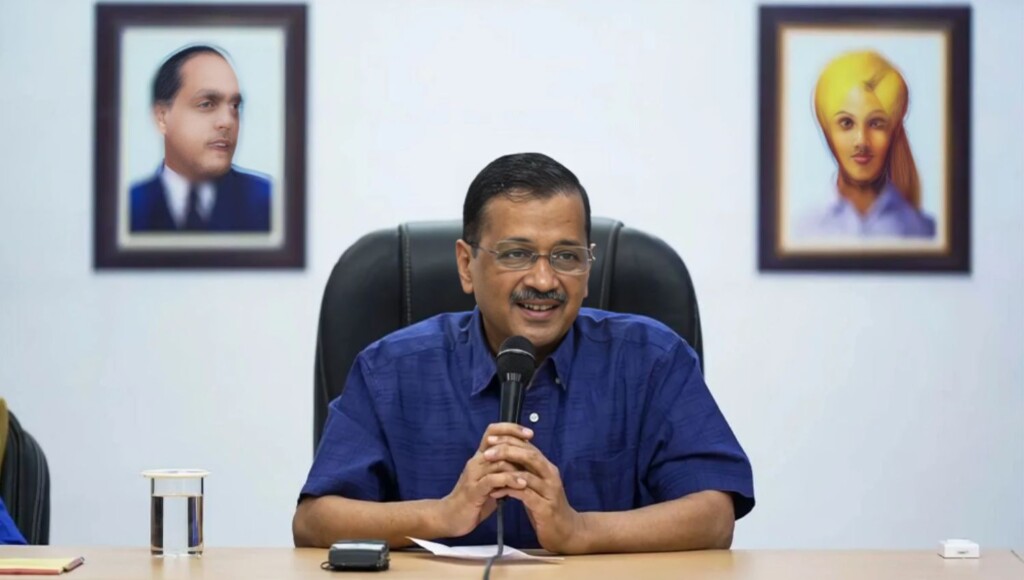The Enforcement Directorate, which took Chief Minister Arvind Kejriwal into custody on March 21 in connection with the Delhi excise policy case, informed the Supreme Court on Friday that they have discovered “personal, direct chats” between Kejriwal and an unnamed hawala operator – a claim disputed by Kejriwal’s legal representative who questioned whether the agency had deliberately withheld this information until now to influence the outcome.
Justices Sanjiv Khanna and Dipankar Datta, presiding over the case, have reserved their judgment on Kejriwal’s plea contesting his arrest by the ED. The agency is investigating allegations of money laundering related to the Delhi excise policy case.
During the proceedings, Additional Solicitor General S V Raju, representing the ED, did not disclose the identity of the hawala operator but informed the bench: “We have now come across conversations between Arvind Kejriwal and the hawala operator. Personal, direct conversations.” This statement was made in response to Justice Khanna’s question regarding the evidence presented by the ED following the Manish Sisodia judgment.
Senior Advocate Abhishek Manu Singhvi, representing Kejriwal, objected to Raju’s statement by asking, “Is this information intended for the court or the media?”
Raju defended the agency’s decision to arrest Kejriwal by stating that the discovered chats justified their actions.
Singhvi’s objection also prompted Solicitor General Tushar Mehta to comment, “We are not holding a press conference, we are presenting our case to the court.
Singhvi reiterated his concerns, questioning whether the prosecutor had intentionally withheld this information to influence the outcome of the case. He emphasized that it was not the prosecutor’s role to engage in such behavior.
Singhvi pointed out that Kejriwal had been arrested in March, and the prosecutor chose to disclose this information as the hearing was concluding. He urged the court not to be swayed by the prosecutor’s actions, describing it as persecution and unfair. Singhvi emphasized the importance of maintaining fairness and standards in the proceedings.
He further criticized the timing of the prosecutor’s revelation, stating that it was an attempt to create doubt and manipulate the court’s decision at the last minute. Singhvi expressed his dissatisfaction with this approach, highlighting that the grounds for arrest had not been argued until 4:30 pm on Friday. He questioned the fairness of such tactics.
In response, Mehta defended the arrest of the hawala operator, which had taken place at 4:30 pm on Friday. Singhvi sarcastically remarked on the convenience of this timing, suggesting that his friend had been suppressing evidence from March until now.
Meanwhile, the bench requested the Enforcement Directorate (ED) to share the case files, expressing its interest in reviewing the witness statements recorded by the probe agency after denying bail to former Deputy Chief Minister Manish Sisodia. The bench also informed Kejriwal that he could seek bail from the trial court if advised, as it had reserved its judgment.
During previous hearings, Singhvi argued that the agency had selectively relied on witness statements against his client while disregarding those that favored him. In response, Raju informed the bench that, according to the law, the defense of the accused cannot be considered even at the stage of framing charges, let alone during the arrest. He deemed it unheard of to entertain such considerations at this stage.
Raju clarified that only the grounds of arrest should be provided, not the reasons for believing so.
Justice Khanna inquired about the consequences if the “relevant material” is not considered in cases of preventive detention. Raju explained that in such a scenario, preventive detention would be invalidated. He further emphasized that preventive detention operates differently.
Justice Datta brought up the ED note regarding Section 19 of the Prevention of Money Laundering Act, which permits ED officers to arrest an individual based on possession of material and a written reason to believe in the person’s guilt. He questioned whether the language of the statute should be altered to “reasonably suspects” instead of “reason to believe.”
Raju clarified that the standard should be more than mere suspicion but less than grave suspicion, evolving as the case progresses. He highlighted that the level of certainty changes from suspicion to conviction, requiring prima facie satisfaction.
In response to Raju’s statements, Singhvi pointed out that the ED disregarded nine exculpatory statements from witnesses while giving weight to others.
Singhvi also raised doubts about the credibility of the witness statements, highlighting that P Sarat Reddy, who testified against Kejriwal, had contributed to the BJP through electoral bonds.
Singhvi emphasized that there is no concrete evidence supporting the allegations of AAP receiving money through illegal channels. He also pointed out that if Kejriwal had indeed demanded a bribe of Rs 100 crore, he should have been directly implicated in the corruption case under the Prevention of Corruption Act.
